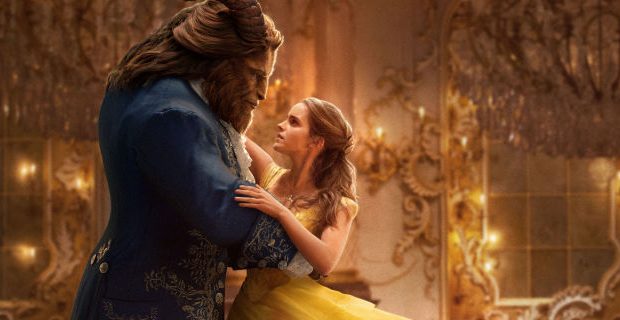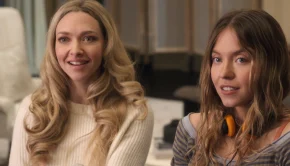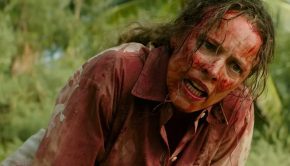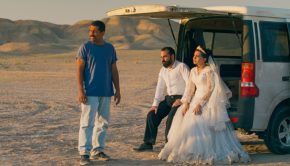Beauty and the Beast – Film Review
Reviewed by Damien Straker on the 24th of March 2017
Disney presents a film by Bill Condon
Produced by David Hoberman and Todd Lieberman
Screenplay by Stephen Chbosky and Evan Spiliotopoulos
Starring Emma Watson, Dan Stevens, Luke Evans, Kevin Kline, Josh Gad, Ewan McGregor, Stanley Tucci, Audra McDonald, Gugu Mbatha-Raw, Ian McKellen and Emma Thompson
Music by Alan Menken
Cinematography Tobias Schliessler
Edited by Virginia Katz
Running Time: 129 minutes
Rating: PG
Release Date: the 23rd of March 2017
Beauty and the Beast is passable family entertainment but its necessity remains questionable. The endurance of French novelist Gabrielle-Suzanna Barbot de Villeneuve’s story is because it’s a classic cautionary tale that’s seen numerous interpretations across both film and literature. This is a double-edged sword for director Bill Condon’s Beauty. It’s difficult to tarnish a story so well recognised but the familiarity is also a challenge that Disney isn’t keen to meet. Instead, Beauty is a safe, straight-forward version that’s unnecessarily decorated with digital effects.
While this is a live action retelling, it doesn’t cement itself as a grounded successor to the 1991 animated film. It embraces the artifice of being cartoon-like first and a musical. The opening scene in a French village is unashamedly old fashioned and corny. The camera pulls away from Belle (played by Emma Watson) as she walks in a snake-like loop through the village; through each street the actors pop up from their stalls to sing. It’s also the least convincing French village you’ve ever seen.
Every character except Belle is a caricature speaking in English with only the occasional French word used in the dialogue. Emma Watson doesn’t adopt an accent and there are no French actors in the other major roles. Instead, the tone is set at a jarringly high comic pitch to justify the caricatures. It’s disappointing because for a live retelling, it doesn’t ground us into a real place. Perhaps the stage-like feel comes from the film’s original but scrapped plan to adapt the 1994 Broadway musical.
Even without seeing the animated version, its highly predictable how the film’s two plotlines will clash. Belle is deemed an outsider of her village, strangely because she reads books, and is romantically pursued by Gaston (The Hobbit’s Luke Evans), despite rejecting his advances. Gaston is accompanied by his friend LeFou (an overwrought Josh Gad, playing Disney’s first gay character) but is oblivious to his interest in him.
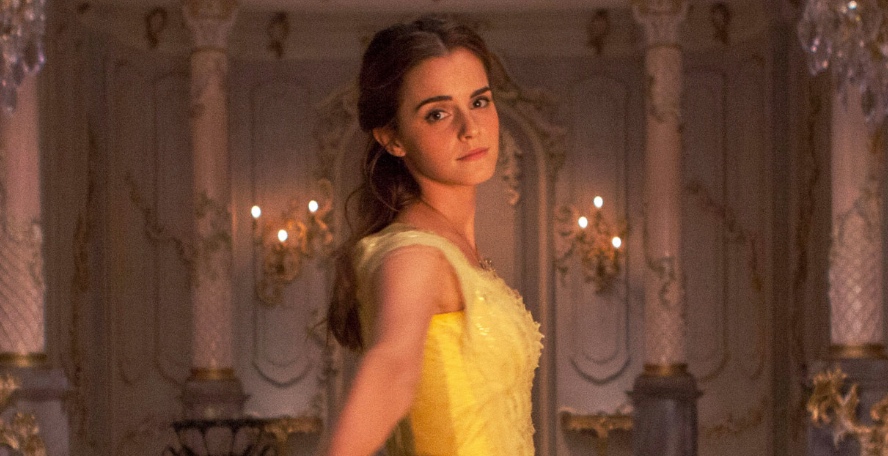
Belle’s ageing father Maurice (Kevin Kline) promises to bring her a rose for her birthday but in stumbling onto a castle in the snow, he’s imprisoned by Beast (Dan Stevens), a prince cursed and transformed into a monster. Beast’s servants were turned into objects: Lumiere (Ewan McGregor), Plumette (Gugu Mbatha-Raw), Chip (Nathan Mack) and Mrs. Potts (Emma Thompson) are a candelabra, a feather duster, a teacup and a teapot, respectively.
Linking these sequences is weak. Right after Maurice is spooked by talking to Chip, he’s undeterred from calmly looking for that rose. Similarly, once he’s captured, his horse bolts back to Belle and she’s suddenly taken to the castle as though the horse has a GPS tracker. Later in the story, a mob easily reaches the castle on foot. The geography and the changes in the climate don’t make any sense.
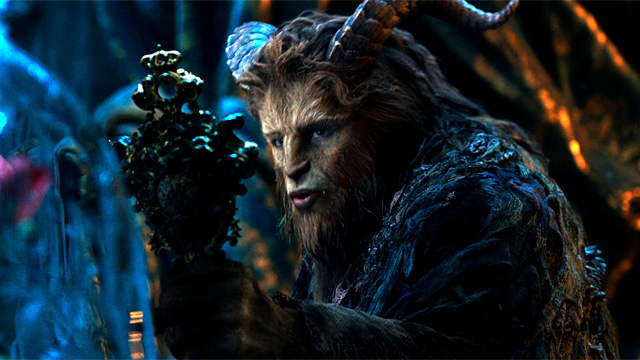
Belle exchanges places with her father. She sees that Beast has an awful temper and refuses to join him for dinner. However, at the pleas of the servants, she resists escaping (really Belle?) because if she falls for Beast their love will transform him and his servants back into humans before a magic rose’s last petal falls.
The story’s coda is strong: men become better people through women and become lonely and deranged without them. It’s also about people being more than their surfaces and male possessiveness. An interesting touch: Beast initially scoffs at the idea of falling for Belle because he brands her the daughter of a thief. The film’s most interesting scene between the gaoler and his captor is staged through a locked door when Beast insists Belle will do as she’s told—it darkly pitches the notion of a woman’s choice becoming non-existent.
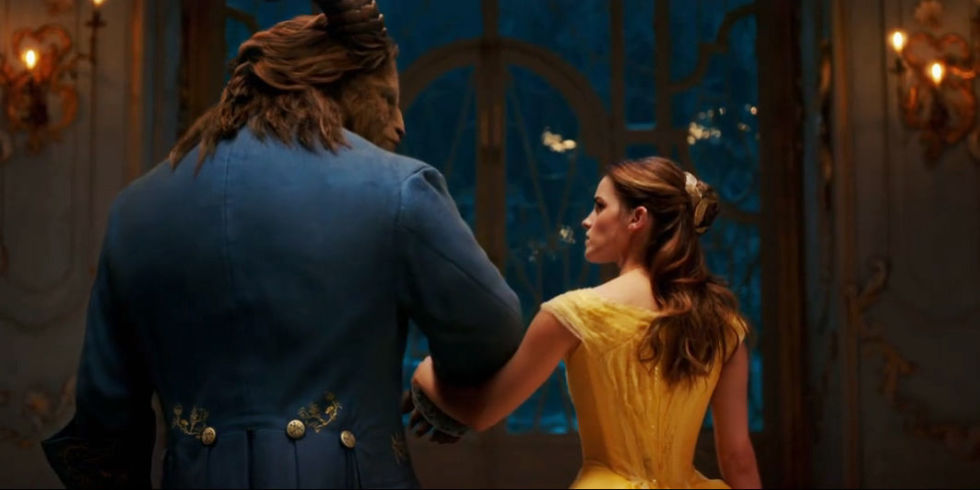
The characters are joined through the loss of their mothers, but the central relationship is wimpy with walks through the snow, drinking soup together and snowball fights. As Belle, Emma Watson’s range isn’t tested beyond a smile or a bitter exchange. Her singing voice is nice but small and too often drowned out by Alan Menken’s overpowering score and the camera retracting away from her. Someone less pristine could have made Belle a quirkier and more active heroine like Moana’s (2017) title character.
Sometimes Beauty is more interested in its special effects and action than its lead actress. A scene where the servants sing to Belle leaves Emma Watson sitting still at the end of a dinner table with nothing to do. Meanwhile, the backgrounds during the iconic dance sequence have CGI trimmings that seem unnecessary. It would also have been nice to see Watson explore a castle that didn’t have exteriors and staircases resembling Hogwarts. Could Beast himself have also been designed differently? There’s many definitions of what a beast can be.
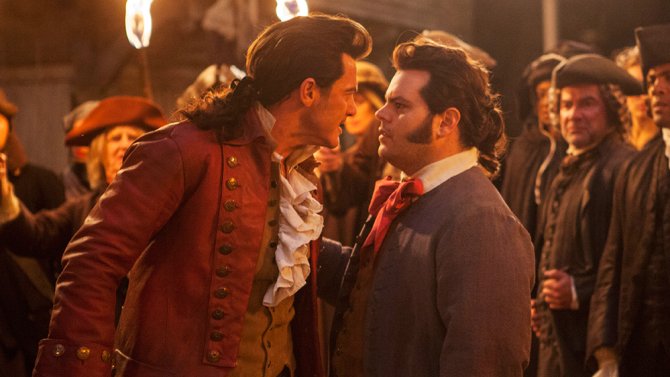
Beauty is unsure of its audience. The tone fluctuates from overly comical to bleak and back again. This is typified by Gaston’s abrupt transition from persistent to psychotic. The film’s overly dark climax sees a crazed mob with flaming torches led by Gaston approaching the castle. However, the mob is soon fended off by a piano firing keys at the attackers and a talking cup of tea pouring liquid on them. Believe me, it’s way more fun writing that out on paper than it is watching the mood of this film spiral so clumsily.
This isn’t to say that Beauty is terrible to watch. The layers of the story are interesting but it’s a confused product and won’t relinquish its digital side to ground the story. Likewise, its unsure about who it’s aiming to please. After Moana and Zootopia (2016), Disney is now a powerhouse corporation that has a rare privilege in Hollywood: they can afford to fail. Remaking recent animated classics and lingering on the past will only deny them the joy of that reality.
Summary: Beauty and the Beast is passable family entertainment but its necessity remains questionable.


